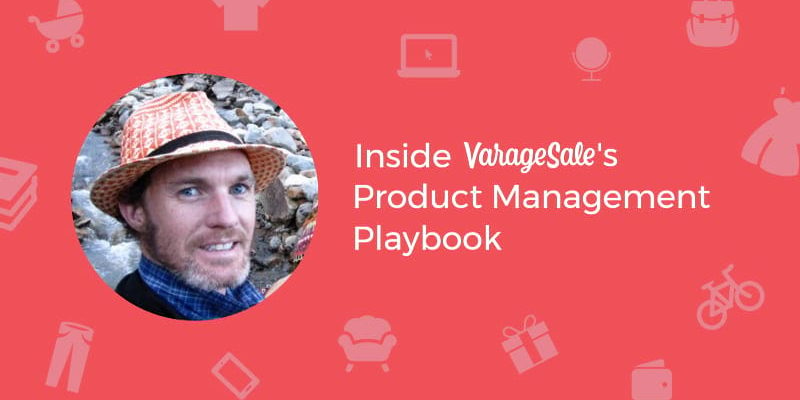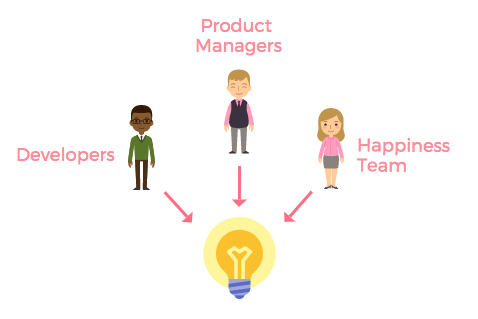Inside VarageSale’s Product Management Playbook

Featuring Robby Jennings, Growth Product Manager
Product manager [noun]: Person responsible for overseeing all activities and functions associated with a particular product or product family (according to Business Dictionary). However, assuming all product managers are the same is like comparing apples to oranges — managing mobile banking can be drastically different from overseeing a retail app.
Our feature for this week is Robby Jennings, a growth product manager at VarageSale. He shared with us his unique path into product management, tips for making user-driven decisions, and thoughts on why testing is so important.
In case you’re wondering, here’s some background on VarageSale.
Chances are that your old bike or mismatched baby outfits were purchased at a yard sale. The concept of buying strangers’ items outside their houses isn’t so novel anymore, but there’s a way to do that faster and more easily online. Enter the world of virtual garage sales — VarageSale. Users are able to join communities and buy/sell items from other users in the area, all from the comfort of a digital device.

A Bit of History
Robby started off as a front end developer at VarageSale, with a strong interest in UX and user accessibility research. He was able to give UX feedback to product managers from both a design and technical perspective — for example, identifying which issues might pop up in development implementation as well as pinpointing problems from a user attraction standpoint.
In addition, Robby had a strong passion for growth and user acquisition. The concept of “growth hacking” to launch the product further was especially enticing, as it required unconventional thinking. However, he was mainly reviewing other people’s ideas and didn’t have as much autonomy to exercise his creative freedom.
Robby’s big break came during a week of downtime when he decided to tackle the VarageSale website. After a lot of competitor research and critical analysis of the site from a developer’s point of view, he pitched a course of action to his VP of Product:
“I see an opportunity. Here are the things we’re winning at, and here are the big things we’re missing. Let me run my own test.”
Guess what? His VP of Product told him to “knock it out of the park,” and he did. Robby designed a new flow, coded and launched it in an A/B test, and saw a 30% increase in mobile sign-ups from the website.
“It was my first shot of product win adrenaline.”
When a PM role opened up at VarageSale soon after, Robby jumped at the opportunity. It was a match made in heaven, as he is now able to double down on growth in an acquisition-focused product team.

Product managers aren’t born. They’re made.
When we asked Robby if he did any prep for the role, he was very eager to bring up a course he took shortly after landing the position: the Reforge Growth Series hosted by Brian Balfour.
“It’s more growth focused, but it was mind-blowing. It just changed my thinking and took me from what felt like 0 to 100 really quickly over eight weeks.”
It did a deep dive into multiple facets of how to grow a company, with focuses on growth models and teams, paid and organic marketing, analytics, testing, and being data-driven. Robby was extremely impressed by the exposure he got to notable industry leaders. As he put it, “one week it’s live-chatting with Casey Winters and asking questions about how he grew Pinterest, then next week it’s the VP of Growth from Atlassian.”
The best way to learn product management is by immersing yourself in the environment, and taking relevant courses is a good way to go. Similarly, Maanas from our last feature also referred to the General Assembly PM program as a big turning point in his career.
On top of that, it’s important to just proactively learn. Read up on Agile, managing backlogs, UX, user psychology, and everything in between. There’s a rich repository of resources out there, but not everyone has the time at work to access them. It’s up to individuals to educate themselves, whether it’s engaging with influencers on Twitter and Linkedin or going through a list of recommended books. Prior to being a PM, Robby spoke extensively with his VP of Growth who shared a list of industry leaders, blogs, and email lists to follow. It was a way for him to get his head into the space and understand the key concepts, models, and techniques that formed a baseline of knowledge.
Users are everything.
“How do we evolve while maintaining a close-knit, closed community where people are highly engaged and super passionate about the product?”
At VarageSale, product management revolves heavily around the customers, and the culture of optimization follows a strong user-first approach. The Happiness team includes Customer Service and Member Support teams that work closely with each selling community to facilitate the smoothest member experience possible. In order for Member Support to immerse themselves within the environment, part of their role is admin-ing the communities. Everyone in the company also uses the app; some use it just to keep up with new changes, while others are buying and selling every week.
“As product managers, we are constantly on the app to be hyperaware of its failings and quirks while using it in the wild, and better understand our members.”
In product feature meetings, a representative of the Happiness team will always sit in to provide member insights, help brainstorm ideas, and evaluate potential user impacts. These direct pre-launch feedback loops act as “on the fly litmus tests” to filter out ideas that don’t mesh with VarageSale’s customer values.

To take it to the next step, VarageSale invited a group of 15–20 users to join as “advisors” in a Slack channel where they’re able to actively provide feedback on new ideas. If Robby shares fresh mockups or product ideas, beta testers in the Slack channel can comment on them right away. The only downside is the sample size — Slack members are generally “super-sellers” and don’t accurately represent the entire community. Nevertheless, first-hand access to user feedback is invaluable and offers a goldmine of insights (as long as they’re taken with a grain of salt).

Robby firmly believes that product management is about being “hyper-conscious of who your people are.” PMs should always be building strong relationships with customers. This could mean doing ad hoc 1-on-1 coffees for individual user testing every week, or following up with community admin feedback in a Facebook group. A study from Invision showed that only 32% of product managers get input from customers before adding features to their roadmap; hopefully, others will gain some insight from VarageSale’s user inclusive playbook.
Test, test, test.
This customer-centric culture is the reason why Robby succeeds with experimentation. By listening to his users, he’s able to come up with strong hypotheses that can really move the needle.
“Something can be posted and sold within 10 minutes. How engaged are your people for that to happen? The focus is on acquiring those people — the highly engaged users who you can get to an “aha moment” and then instantly hook. They’re harder to find, but they’re worth more to us as customers.”
For Robby, a lot of A/B testing comes down to optimizing for those early touchpoints. VarageSale as a product becomes sticky early in the user journey, so split testing is mainly used to double down on activation flows and first day user experiences. The million dollar question is: how can customers reach the “aha moment” faster?
Mobile is definitely a main channel to test around, as 90% of users access the platform through the application. Compared to mobile web, the app is smoother, has more engagement levers (eg. push notifications), and has much better retention. Combining relevant, timely push messaging with a stellar in-app experience is what keeps users coming back for more.
“Out of the native app user base, 45% return on a daily basis up to 5 or 6 times a day. With such engaged users, this type of frequency is more similar to a social platform than a regular buy-sell platform.”
Overall, one of Robby’s favorite things about being a growth PM at a startup is the fast pace and drive to continually iterate. Experimentation and innovation will always thrive in a culture that’s open to trying.
“If you can sell an idea, people aren’t going to block you. If you’re super engaged, people don’t want to stop you.”

Check out Robby’s LinkedIn or follow VarageSale on Twitter
Taplytics is a fully integrated mobile A/B testing, push notification, and analytics solution providing the tools you need to optimize your mobile app.

